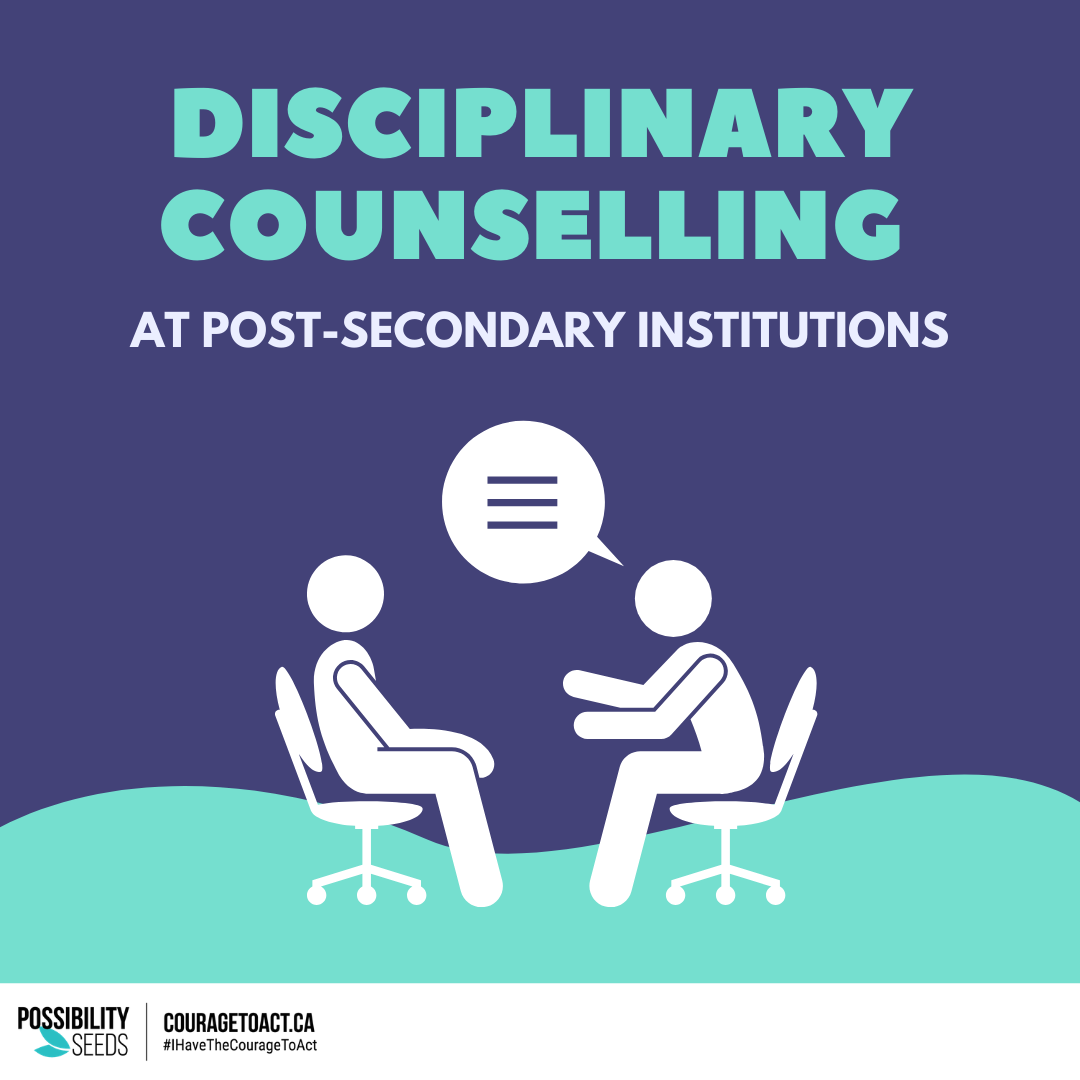A Short Commentary on Disciplinary Counselling at Canadian PSIs
A Short Commentary on Disciplinary Counselling at Canadian Post-Secondary Institutions
Written by: Dr. Jesmen Mendoza
Once a finding has been made in a student judicial affairs process, the respondent is now considered to be a person who has been found to cause harm. Such a person is then subject to a number of measures or sanctions. Such sanctions can range from reviews and reprimands to suspensions and expulsions. Amongst this range and encoded in some Canadian post-secondary institutions (PSI) policy on gender-based violence is the provision of counselling. However, a cursory check within communities of practice affiliated with the Courage to Act project suggest that this form of sanction might be fairly underutilized in the Canadian PSI context. Three factors may help explain why this is the case.
First, its underutilization may primarily be attributable to PSIs’ misconception of how counselling can be a sanction for those who have caused harm. Quite often counselling is viewed as a supportive and helpful intervention. And although this is true, with respect to people who have caused harm (PWHCH), counselling is more of an intentional conversation between the trained clinician and such individuals. Such conversations involve holding PWHCH accountable for their actions and taking responsibility by not minimizing, denying or blaming the victim, and/or survivor. Further, such conversations strongly encourage and challenge PWHCH to examine and reflect deeply on their gendered beliefs and how it has shaped their behaviours. Barriers to adopting healthier behaviours are also examined and those healthier behaviours are subject to being taught by the clinician. Such conversations, in the end, may be helpful to the PWHCH. However, most PWHCH do not come to counselling without some form of resistance or reactance to this (or any other) type of sanction imposed upon them. In some ways, counselling is a misnomer, and such sanction offered by a PSI should ought to be called disciplinary counselling instead.
Second, As described above, the ability to deliver disciplinary counselling needs specialized training where such clinicians have knowledge of not only student development theory, psychotherapy training, but also experience in forensic mental health. Such knowledge and training in these areas can help ensure that such disciplinary counselling is not only being provided but provided well. One can find clinicians who have knowledge and training in student development theory and psychotherapy at the PSIs counselling centre. However, knowledge of and training in forensic mental health is a speciality and expertise typically found outside of the PSI sector and considerations should be made in finding individuals who have a dual interest in both PSI counselling work and forensic mental health.
Third, In addition to this misconception of what disciplinary counselling is, and finding clinicians who are trained at offering such specialized work, a question remains as to where to house disciplinary counselling and those who provide it. At first blush, one would believe that such a program and its providers would be held at the PSI’s counselling centre. Historically, however, PSIs and their counselling centres have been administratively neutral in the hopes of providing service (or at least maintaining the appearance) of being unbiased and thus student-centred (Kiracofe and Wells, 2007). And although a trained clinician could still provide disciplinary counselling in an unbiased, student-centred and non-shaming manner, such a clinician would still admit that their primary client is not the PWHCH. Rather, it is the safety of victims, complainants and the campus community, and that their work with the PWHCH is in service of this goal. And this goal, ironically enough, is value-based, and would appear to not be neutral. This may perhaps run contrary to the administratively neutral position that a PSIs counselling centre would normally take.
The question that remains for a PSI to consider is whether they should offer this important form of sanction, and if they do decide to offer it, where can they find the individuals interested in delivering this challenging and yet rewarding type of work, and finally, where should this work be housed at the PSI, if not at the PSIs counselling centre.
__________
Suggested Citation: Mendoza, Jesmen. (2021, February). A Short Commentary on Disciplinary Counselling at Canadian PSIs. Courage to Act. www.couragetoact.ca/blog/disciplinary-counselling



